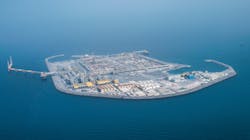Abu Dhabi's Project to Decarbonize Offshore Production Operations
On Dec. 22, 2021, the Abu Dhabi National Energy Company (TAQA) announced a landmark renewable energy project to significantly decarbonize the state-owned oil and gas producer Abu Dhabi National Oil Company’s (ADNOC) offshore production operations and accelerate the UAE’s efforts to achieve its 2050 net-zero ambitions. In September 2022, TAQA achieved financial close on this $3.8 billion project.
In navigating the energy transition, global energy players are introducing a greater mix of renewable energy sources, such as solar PV, wind and battery penetration. Equally as important to delivering this transition is decarbonizing the entire value chain, including existing oil and gas assets and building transmission networks to enable the dispatch and effective deployment of low carbon power to end customers.
The project will be funded through a special purpose vehicle (SPV) – a dedicated company that will be jointly owned by TAQA and ADNOC (30% stake each), and a consortium comprised of Korea Electric Power Corporation (KEPCO), Japan’s Kyushu Electric Power Co. and Électricité de France (EDF). Led by KEPCO, the consortium will hold a combined 40% stake in the project on a build, own, operate and transfer basis.
The innovative project will see the development of two independent sub-sea High Voltage Direct Current (HVDC) systems, the first of its kind in the Middle East and North Africa region, with each comprising transmission cables, onshore and offshore converter stations and an offshore Geographic Information System based within the Emirate of Abu Dhabi.
By connecting with nearby offshore centralized power hubs that are linked with the onshore grid via HVDC subsea transmission lines, ADNOC’s offshore production facilities will be able to import electricity from the country’s onshore national power grid which is owned by TRANSCO.
The introduction of the HVDC systems is also expected to reduce the carbon footprint of ADNOC’s offshore operations by 30%. Reduction of its carbon impact remains a key priority for the world’s 12th largest oil producer as it prepares to meet future market demand that calls for a 25% increase in output requirements equating to 5 million barrels of oil per day by 2030.
Construction of the HVDC systems, which will feature a total installed capacity of 3.2 GW, will be led by main EPC contractors, Jan De Nul Group and Samsung C&T Corporation, who hold proven, global track records of delivering projects of this nature. Following 35 years of operation, management of the assets will be transferred to ADNOC.
Replacing the company’s captive power generation assets that are presently powered by Gas Turbine Generators, the project is expected to expand ADNOC’s reliance on electricity from green and low-carbon emitting energy sources, while also addressing its rapidly growing power requirements across its offshore operations.
The success of the renewable energy project with ADNOC showcases not only TAQA’s ability to drive national decarbonization efforts across the full end-to-end energy value chain but also demonstrates our ability to capitalize on the increasing number of market opportunities that have arisen following the unveiling of UAE's Net Zero 2050 strategic initiative.
Over the last decade, the UAE has embraced higher mixes of renewable power – particularly solar photovoltaic (PV). Noor Abu Dhabi, one of the world’s largest single-site solar PV projects, commenced operations in April 2019 and contributes to a carbon emissions reduction of 1 million metric tons per year, which is the equivalent to taking 200,000 cars off the road. Similarly, Al Dhafra Solar PV, which will be almost double the size of Noor Abu Dhabi at 2 GW upon completion, will offset 2.4 million metric tons of carbon dioxide annually.
In recent years, renewable energy projects have become a common addition to investment portfolios as ESG considerations are increasingly prevalent and strategic to prospective investors. The UAE’s ability to drive the success of such projects, along with its strong commitment to addressing global energy challenges with conventional and proven supply sources, is one of the many reasons that the country serves as a regional leader today.
With the completion of our renewable energy project with ADNOC, the first of many endeavors to be undertaken within the region’s transmission infrastructure market, we find ourselves not only one step closer toward achieving the strategic goals of the UAE’s Net Zero 2050 initiative, but to also realizing a sustainable future and national economy powered by innovation.
Omar Al Hashmi is executive director of Transmission and Distribution at Abu Dhabi National Energy Company (TAQA).
About the Author
Omar Al Hashmi
Omar Al Hashmi is executive director of Transmission and Distribution at Abu Dhabi National Energy Company (TAQA).
